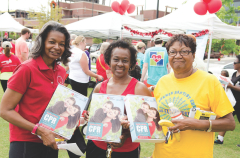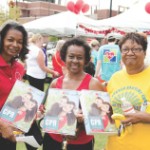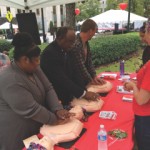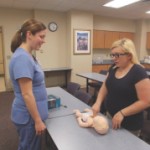The American Heart Association and United Way of Central Alabama helped train thousands in Hands-Only CPR this year.
BIRMINGHAM, Ala. – The year 2014 was the year of CPR for organizations in Central Alabama. The American Heart Association estimates that 20,000 Birmingham area residents were trained in 2014 in Hands-Only CPR – a tool that could be the difference between life and death for someone experiencing cardiac arrest. About 400,000 Americans suffer from cardiac arrest annually, with only 9.5 percent surviving an event. Central Alabama is no stranger to heart disease, which causes 30 percent of all deaths each year in the region. To address this pressing health threat, the American Heart Association implemented the Community CPR Program to ensure more by-standers can initiate Hands-Only CPR in a time of need.
Through a generous grant from the United Way of Central Alabama, The American Heart Association equipped the following partners and programs with Hands-Only CPR training resources:
· Jefferson County Schools
· Birmingham City Schools
· YMCA of Greater Birmingham
· Diocese of Birmingham
· A.G. Gaston Boys & Girls Club
· Children’s of Alabama
· UAB Hospital
· Brookwood Medical Center
· Shelby Baptist Medical Center
· Princeton Baptist Medical Center
· Birmingham-area NICUs
The Birmingham Black Nurses Association and Ross Stores have also partnered with the AHA to develop CPR programs for underserved urban and rural communities in Alabama where bystander CPR rates tend of be much lower and/or emergency response times lag far behind the national average.
Through these Community CPR Programs, Birmingham residents can learn the fundamental skills involved in administering Hands-Only CPR in less than 30 minutes. Hands-Only CPR is without mouth-to-mouth breaths and is recommended for by use for people who see an adult or teen suddenly collapse in an “out of hospital” setting. Pressing hard and fast in the center of the chest at the rate of 100 beats per minute can double or triple the chances of survival for someone with sudden cardiac arrest. After 10 minutes without CPR, the chance of survival is virtually nil.
“We have made great strides this year to see Central Alabama more CPR-ready,” said Rachael Wilson, Communications Director for the American Heart Association in Alabama. “Evidence to date suggests that our Community CPR Program will help us achieve our 2020 impact goal of improving the cardiovascular health of all Americans by 20 percent, while reducing deaths from cardiovascular diseases and stroke by 20 percent, by the year 2020.”
In 2015, the American Heart Association will continue to focus on environments where capacity to engage is high and need for CPR is most critical.





